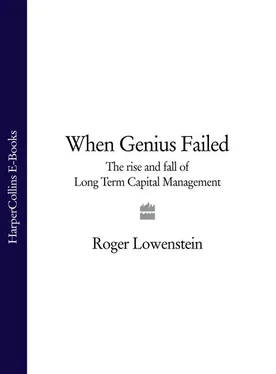Komansky, who personally had invested almost $1 million in the fund, was terrified of the chaos that would result if Long-Term collapsed. But he knew how much antipathy there was in the room toward Long-Term. He thought the odds of getting the bankers to agree were long at best.
Komansky recognized that Cayne, the maverick Bear Stearns chief executive, would be a pivotal player. Bear, which cleared Long-Term’s trades, knew the guts of the hedge fund better than any other firm. As the other bankers nervously shifted in their seats, Herbert Allison, Komansky’s number two, asked Cayne where he stood.
Cayne stated his position clearly: Bear Stearns would not invest a nickel in Long-Term Capital.
For a moment the bankers, the cream of Wall Street, were silent. And then the room exploded.
THE RISE OF LONG-TERM CAPITAL MANAGEMENT
IF THERE WAS one article of faith that John Meriwether discovered at Salomon Brothers, it was to ride your losses until they turned into gains. It is possible to pinpoint the moment of Meriwether’s revelation. In 1979, a securities dealer named J. F. Eckstein & Co. was on the brink of failing. A panicked Eckstein went to Salomon and met with a group that included several of Salomon’s partners and also Meriwether, then a cherub-faced trader of thirty-one. “I got a great trade, but I can’t stay in it,” Eckstein pleaded with them. “How about buying me out?”
The situation was this: Eckstein traded in Treasury bill futures—which, as the name suggests, are contracts that provide for the delivery of U.S. Treasury bills, at a fixed price in the future. They often traded at a slight discount to the price of the actual, underlying bills. In a classic bit of arbitrage, Eckstein would buy the futures, sell the bills, and then wait for the two prices to converge. Since most people would pay about the same to own a bill in the proximate future as they would to own it now, it was reasonable to think that the prices would converge. And there was a bit of magic in the trade, which was the secret of Eckstein’s business, of Long-Term Capital’s future business, and indeed of every arbitrageur who has ever plied the trade. Eckstein didn’t know whether the two securities’ prices would go up or down, and Eckstein didn’t care. All that mattered to him was how the two prices would change relative to each other.
By buying the bill futures and shorting (that is, betting on a decline in the prices of) the actual bills, Eckstein really had two bets going, each in opposite directions. *Depending on whether prices moved up or down, he would expect to make money on one trade and lose it on the other. But as long as the cheaper asset—the futures—rose by a little more (or fell by a little less) than did the bills, Eckstein’s profit on his winning trade would be greater than his loss on the other side. This is the basic idea of arbitrage.
Eckstein had made this bet many times, typically with success. As he made more money, he gradually raised his stake. For some reason, in June 1979, the normal pattern was reversed: futures got more expensive than bills. Confident that the customary relationship would reassert itself, Eckstein put on a very big trade. But instead of converging, the gap widened even further. Eckstein was hit with massive margin calls and became desperate to sell.
Meriwether, as it had happened, had recently set up a bond-arbitrage group within Salomon. He instantly saw that Eckstein’s trade made sense, because sooner or later, the prices should converge. But in the meantime, Salomon would be risking tens of millions of its capital, which totaled only about $200 million. The partners were nervous but agreed to take over Eckstein’s position. For the next couple of weeks, the spread continued to widen, and Salomon suffered a serious loss. The firm’s capital account used to be scribbled in a little book, left outside the office of a partner named Allan Fine, and each afternoon the partners would nervously tiptoe over to Fine’s to see how much they had lost. Meriwether coolly insisted that they would come out ahead. “We better,” John Gutfreund, the managing partner, told him, “or you’ll be fired.”
The prices did converge, and Salomon made a bundle. Hardly anyone traded financial futures then, but Meriwether understood them. He was promoted to partner the very next year. More important, his little section, the inauspiciously titled Domestic Fixed Income Arbitrage Group, now had carte blanche to do spread trades with Salomon’s capital. Meriwether, in fact, had found his life’s work.
Born in 1947, Meriwether had grown up in the Rosemoor section of Roseland on the South Side of Chicago, a Democratic, Irish Catholic stronghold of Mayor Richard Daley. He was one of three children but part of a larger extended family, including four cousins across an alleyway. In reality, the entire neighborhood was family. Meriwether knew virtually everyone in the area, a self-contained world that revolved around the basketball lot, soda shop, and parish. It was bordered to the east by the tracks of the Illinois Central Railroad and to the north by a red board fence, beyond which lay a no-man’s-land of train yards and factories. If it wasn’t a poor neighborhood, it certainly wasn’t rich. Meriwether’s father was an accountant; his mother worked for the Board of Education. Both parents were strict. The Meriwethers lived in a smallish, cinnamon-brick house with a trim lawn and tidy garden, much as most of their neighbors did. Everyone sent their children to parochial schools (the few who didn’t were ostracized as “publics”). Meriwether, attired in a pale blue shirt and dark blue tie, attended St. John de la Salle Elementary and later Mendel Catholic High School, taught by Augustinian priests. Discipline was harsh. The boys were rapped with a ruler or, in the extreme, made to kneel on their knuckles for an entire class. Educated in such a Joycean regime, Meriwether grew up accustomed to a pervasive sense of order. As one of Meriwether’s friends, a barber’s son, recalled, “We were afraid to goof around at [elementary] school because the nuns would punish you for life and you’d be sent to Hell.” As for their mortal destination, it was said, only half in jest, that the young men of Rosemoor had three choices: go to college, become a cop, or go to jail. Meriwether had no doubt about his own choice, nor did any of his peers.
A popular, bright student, he was seemingly headed for success. He qualified for the National Honor Society, scoring especially high marks in mathematics—an indispensable subject for a bond trader. Perhaps the orderliness of mathematics appealed to him. He was ever guided by a sense of restraint, as if to step out of bounds would invite the ruler’s slap. Although Meriwether had a bit of a mouth on him, as one chum recalled, he never got into serious trouble. 1Private with his feelings, he kept any reckless impulse strictly under wraps and cloaked his drive behind a comely reserve. He was clever but not a prodigy, well liked but not a standout. He was, indeed, average enough in a neighborhood and time in which it would have been hell to have been anything but average.
Meriwether also liked to gamble, but only when the odds were sufficiently in his favor to give him an edge. Gambling, indeed, was a field in which his cautious approach to risk-taking could be applied to his advantage. He learned to bet on horses and also to play blackjack, the latter courtesy of a card-playing grandma. Parlaying an innate sense of the odds, he would bet on the Chicago Cubs, but not until he got the weather report so he knew how the winds would be blowing at Wrigley Field. 2His first foray into investments was at age twelve or so, but it would be wrong to suggest that it occurred to any of his peers, or even to Meriwether himself, that this modestly built, chestnut-haired boy was a Horatio Alger hero destined for glory on Wall Street. “John and his older brother made money in high school buying stocks,” his mother recalled decades later. “His father advised him.” And that was that.
Читать дальше












